#modernist ring
Text
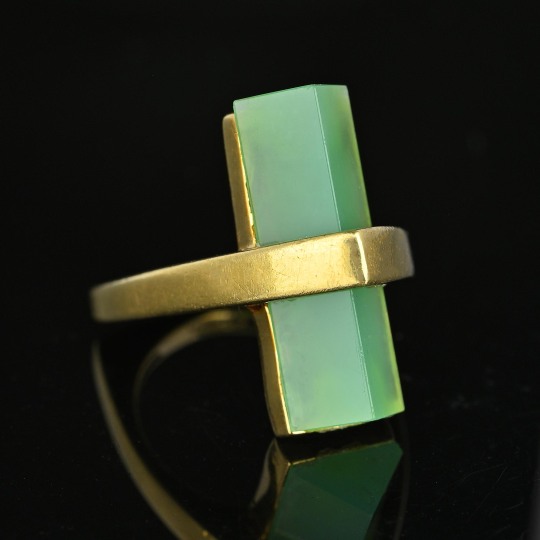

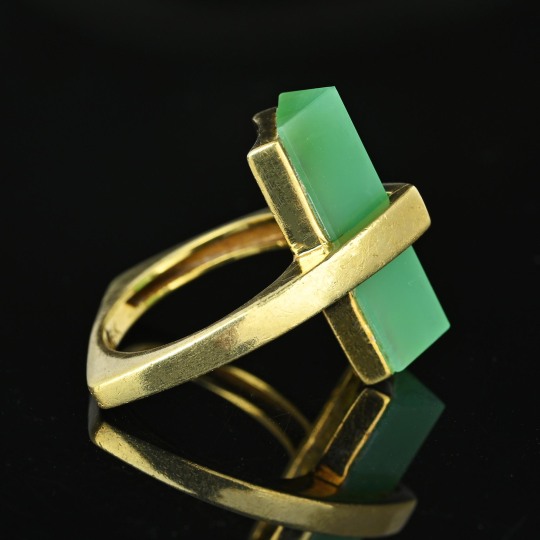
Modernist 18K Gold Green Chalcedony Ring, Euro Shank
Found on Boylerpf.com
#jewelry#gold#jewellery#vintage#boylerpf#vintage jewelry#18k gold#modernist ring#green chalcedony#chalcedony ring#vintage ring#vintage rings#unique ring#designer jewelry
83 notes
·
View notes
Text
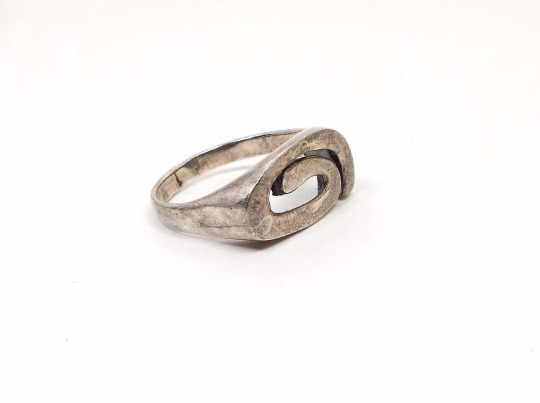
#retro#vintage#rings#vintage rings#sterling silver#sterling rings#modernist jewelry#925 rings#sterling jewelry#jewelry#vintage jewelry#sharkyswaters#silver#1980s
29 notes
·
View notes
Photo

Modernist gold and diamond starburst earrings and ring, c. 1970s (at The Back Vault)
41 notes
·
View notes
Photo
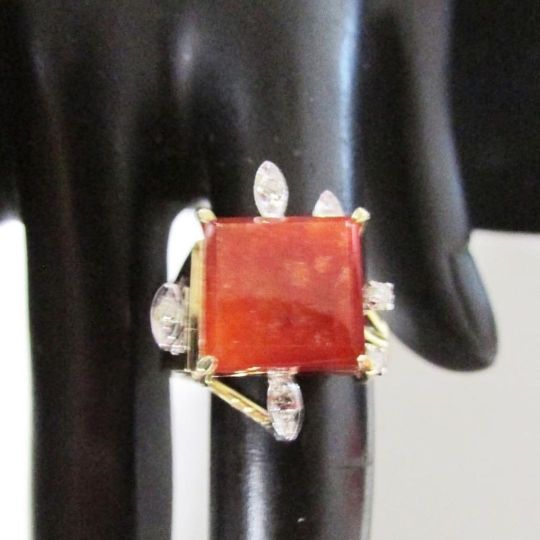
Vintage Estate Modernist 14K Square Cut Red Orange Jade with Diamond Accents Ring @alohamemorabiliaco #instaview #instajewelry #ring #showmeyourrings #modernist #jade #redjade #estatejewelry #vintagejewelry https://www.instagram.com/p/ColbM9ppnoT/?igshid=NGJjMDIxMWI=
2 notes
·
View notes
Photo

In my #etsy shop: Unusual #Vintage #Modernist #Brutalist #Silver #Ring with Bark Design 1970’s #Unisex #plantstrees #freeform #investment #unusual https://etsy.me/3cshAMi https://www.instagram.com/p/Ch2fuZTIoCd/?igshid=NGJjMDIxMWI=
2 notes
·
View notes
Text
0 notes
Text
Homura day one checklist
Wake up. Cry a little about how things went last time. Tell yourself this is the loop you'll save Madoka. Force yourself to get out of bed
Fix eyes with magic. Remove glasses
Fix heart condition with magic. Let down your hair
Get dressed. Your school uniform is appropriate everywhere so there's no need to bother with other clothes. Check out of hospital
Break into yakuza hideout and steal guns while time is stopped
Break into second yakuza hideout and steal more guns
Break into military base and steal more guns
Break into second military base and steal more guns
Break into third military base and steal more guns
Visit your favorite apartment complex and submit an application to rent the ultra-modernist white box apartment you've decided on after dozens of loops. Who cares if you can afford rent, the building will be destroyed in a hurricane in a month anyway
Visit a furniture store and acquire your favorite couch, a large circular arrangement made of several concentric rings in the shape of a clock
Visit an electronic goods store and acquire thirty televisions to assemble the wall of screens you like to use to lay out your research
Visit a home goods store and acquire various miscellaneous items - pots and pans, utensils, a futon to sleep in, etc
Capture Amy the cat and take her to a shelter to prevent Madoka from making a wish to heal her
Kill particularly easy witch whose location is consistent on the first day. You'll need the grief seed in the coming weeks
Wait for night to fall and break into a certain art gallery with an exhibit of an enormous free swinging knife pendulum. Steal it for your own use
Break into Mikuni Oriko's house and murder her to prevent her from making a contract and trying to kill Madoka
Break into Kure Kirika's house and murder her to prevent her from doing anything drastic in response to Oriko's death
Return to your newly rented apartment and assemble all of the new decor stored in your convenient magic shield. It's good to be home
It's time to go to sleep. Time travel is a lot of work but you get to see Madoka again soon. You can't wait for morning 😌
3K notes
·
View notes
Text
There is an interesting discussion to be had about the concept of “video game player guilt” and how it ties into what I’m going to refer to as “narrative responsibility”. I personally believe that games with a post-modernist approach to the relationship between the medium and their audience, where the latter’s engagement with the former is called into question, tend to fall into a self-contradictory pitfall, interestingly though they may do so.
Games tend to punish the player for mistakes made within their framework, whether it be from the perspective of their gameplay or their narrative. Soulsborne games offer an excellent example of both, wherein a rash approach to fights lead to merciless death, while hurting NPCs bars the player from witnessing the conclusion of their arcs, along with being denied the tangible rewards they may yield. Both are punishing, but there is a fairness to it, and - most importantly - the game ultimately does not judge your choices. You can link the fire or bring darkness to the world, but the game acknowledges that it gave you the choice, let you run with it, and doesn’t call it into question, because the option was laid there for you to take it, if you so willed.
And why wouldn’t you, honestly? You can certainly feel guilt at the cruel choices you make in an RPG, at the suffering experienced by characters in a Visual Novel as the result of the choices you made, but feeling an emotional response to a narrative does not mean you also lack awareness that it is, ultimately, a made-up fantasy.
Games like Spec Ops: The Line pioneered this genre of meta-narrative where the player’s actions are called into question through the avatar they control, but to me, however fascinatingly woven, they ultimately fall flat, because if the responsibility falls on anybody for having wrought the tragedies depicted, it’s on the developers. At worst, calling out a video game player for... playing a video game feels like a bid for sensationalist boldness than anything else. The Genocide Route in UT is completely optional, but being called out by the person who coded and wrote said tragedy rings a tad hollow.
I cannot see how wanting to experience everything a piece of media has to offer can be wrong, nor the supposedly inherent wrongness of people playing and enjoying games in their own ways. Sure, I might not understand people who play a Fire Emblem game purely like a game of chess without caring for its narrative aspects - or viceversa - but I believe that illustrates the beauty of games more than its flaws. There is much to discuss about the relationship between violence, video games and people’s approach to both, for sure. But treating the player’s responsibility as the equivalent of the developer putting a gun in their hand and accusing them when they inevitably pull the trigger feels a bit silly, you feel me?
814 notes
·
View notes
Text
today was the whole-trilogy extended editions we-die-like-riders-of-rohan-in-a-26-degree-movie-theater marathon of lord of the rings, and i gotta say watching these movies two decades later,
they're still delightful
it's funny how they seem more and more an artifact of the period they were produced in (not in a bad way, mind)
it is annoying how little peter jackson trusts his audience. like. all major landmarks have to be within line of sight of each other. voice overs have to unambiguously lampshade every plot beat that was foreshadowed earlier in the movie. gandalf all but literally says at the end of the two towers "see you next time in... return of the king!" moments in the books that are already hella cinematic like the paths of the dead have to punched up just a little extra, like with an indiana jones skull slide. and it's just not necessary! trust your audience!
you can really tell what dialogue is from the books, and what dialogue is original attempts at tolkien pastiche, because even if you don't know the books encyclopedically, the walsh-boyens-jackson team is just. not at all up to doing the pastiche well. this isn't counting the lines that are absolutely cringe, like "let's hunt some orcs." or all of gimli's dialogue. god they do gimli so dirty turning a prince of the dwarves into the drunken comic relief.
when did we decide all dwarves were scottish, and they all used the same vaguely modernist angular architecture? i think it was before lord of the rings. was it in the 90s? the 80s?
was the Tomato Incident a spontaneous choice by john noble or a directorial decision? did they have to do multiple takes?
it's so fun watching these movies in theaters now because the bits that gets everyone to laugh or cheer are the ones that have seeped into pop culture in weird ways. "they're taking the hobbits to isengard," of course. "po-ta-toes." but also just aragorn kicking the helmet got a big giggle from the audience, because everyone was Thinking The Thing.
some extremely committed soul came in cosplay, with a thick elven-style cloak and everything, despite the fact it was unusually hot today and the Babylon's ac was not coping well. i don't know how they survived. i hope they survived?
#not even getting into the ways in which jackson's attempts to simplify the events around helm's deep#end up rendering the battle kinda incoherent#bc bret devereaux has already covered that ad nauseam
107 notes
·
View notes
Text
crying, laughing, loving, lying - being comfortable is no good
pairing: roman reigns x angel (black oc)
warning: this little chapter is all angst and unfortunately barely features angel. but i'm giving backstory!! no other warning besides swearing and talks of divorce.
authors note: i love imperfect characters. so yummy. first chapter found here.
word count: 1700

roman loves his job. he loves the campus. and he loves his office —which to him, despite seth's modernistic sneering, is wholly traditional—outfitted tirelessly to suit a timeless sense of taste. dark wood furnishings and overly warm lamp lights. deep shelf walls and old brass ceiling fans. the neat clutter of sports paraphernalia surrounding unread midterm papers —which detailed in their own ways and intellectual fashions, the steady rise of sociopolitical tensions of pre-world war-two society through a 1936 olympic games lens — and once looked over defensive plays meant for forthcoming football games. and this here was his little heaven, his peace, but said peace was being tainted. squandered and spat on. because of all the days he'd chosen to settle in at the office on campus versus doing work from home, she, had stopped by to see him this day. to parade around that pitiful frowning in her lips and the beautiful, un-useable ring she'd never bothered to just get rid of.
and he was very specific about not getting it back. about not wanting it back. about her even selling it, if thats what she wanted. since she'd always done what she wanted anyways. what difference would it make if she sold the eighteen karat in exchange for whatever dress or lamp or table caught her eye? roman really couldn't give less than a shit what she exchanged it for, just as long as he'd never have to see it again. because all the memory is stored there, in the all those beautiful cuts of diamond. but then again, as he said to himself, 'amina does what she wants', including showing face when showing face was exactly what he didn't need.
he seems to be the only tired one in all this. the only struggling survivor, hell the only survivor really. amina's face feening to look written in a perpetual state of guilt which was complete, utter bullshit. but then again disingenuous was her forte. and roman was sure that the divorce lawyer was the happiest they'd ever been. maybe even eating off the money they'd made at the expense of his failed marriage. but who knew. at this point, who fucking knew.
his glasses give the ring clarity. a shine. making his jaw twitch and his foot shift till his knee jumps. all of which are involuntary. and this burns his core, the very base of his belly, because why does the discomfort take him so wholly? unsullied and lacking compassion as it travels his skin.
he can feel her eyes fixing into him. screwing hot over every line and detail of his freckled face as she waits. and oh does roman make her wait. letting the silence drown the room till theres nothing but the whipping spin of the ceiling fan and the warm lamps singing with a buzz.
"are you gonna say something?"
and all he can remember is his bed. the distress of the sheets and the boiling heat in his body. her moaning and then the absolute fright. the guilt as she forced her body away into the wall, the sheets surrounding her, drowning her up to her neck. his fingers cold from the breeze.
the ring still on her finger. why even keep it on?
something in roman's skin flares. a burning irritation. an anger bought on by the existence of anger itself. because why should he be reduced to something this wild and ill-controlled? why should he be the one suffering, feeining stability. why should a simple ring bother him so much. he was, is, better than this, better than the pity written in her eyes. he hated this. why didn't she just fucking sell the damn ring.
"hows terry doing?", that name like poison on his tongue. the whole memory of it coming up to dry his throat till he's tasting bits of bile. his fingers flexing as he takes to fingering over the stacks of papers at his desk. "still enjoying my headboard?"
"don't do that...", amina's eyes averting. guilt, guilt and more guilt. "...don't, don't bring him up like it's on him".
"oh?". a scoff but a laugh too. disgust and amazement. but he's irritated too. surprised. "is this accountability? are we in the end times finally?"
she sighs exhausted. "roman".
"amina", exhausted too but wryly so. to dig into her skin in any way he could.
and when she takes her beat, which he finds annoyingly dramatic, staring into his eyes with all the sincerity drawn up from her gut to say "i'm sorry", he still can't find the will to care.
and he tells her as much.
"i. don't. care", pushing the ring with his finger over toward the edge of his desk. the fast motion threatening to knock it off the surface if not for amina snatching it mid drop. "take the ring back. pawn it. sell it. shove it in an envelop and burn it", rising from his seat to take a stack of book at the side of his desk to the deep shelf wall. his body tall and wide and rife with anger. "i don't give a shit. i don't want it".
he can hear her shifting to get up too. her heels clicking small. cautioned steps. not so far but not too close. and now he's sees that's just been the regular state of affairs for everything concerning them. an arms distance of romance.
"it belongs to you".
one of the books tighten in his hand. a hard cover stress ball. "the simple fact, that i keep saying i don't wan't it, and you keep shovin' it in my face, really just lets me know you’re here to twist the knife". he shelves the books impatiently, the slotting of them ending, each, with a thud into the wood. "just give me this one thing. listen to me this one time".
amina takes her turn to bristle. to advance at him and laugh. mirthless and mocking.
"you wanted the wedding in the summer, so we planned it for july. you wanted to move back home, so i followed you", each click of her heel harsh against his office floors. straining to creak till it's edging into his skin. "you wanted the bigger house and you didn't want me to work and you didn't want me to hang around certain men. i always listened to you".
'no', roman thinks. whipping away from the shelf. his ears scorching. "wrong", his pointing finger toughing into his chest. "i didn't want you around terry because he was a dog in fucking heat every time you were near him. and everything was always negotiable. i never forced anything". his blood pumping sharp and wild. "you liked me making decisions. you liked being taken care of. i made shit a playground for you, and you ran it to hell till you got caught".
"negotiable? really?", amina's voice shrill and wavering. "like its a fucking business deal? well so much for a fucking merger of equals”. the ring clutched in her fist, her balled fingers pushing into his chest as she clicks up to him. no longer an arms length away. "you just knew that you knew what was best all the time".
and when he refuses to accept her forcibly pushing against his chest, the ring falls.
"and the one thing i didn't know?", his face a breath away from hers. the warmth of vanilla filling his nose. making his screen cringe and his jaw tighten. "that my wife was getting fucked cervix deep in my bed by terry, every other weekend since the night of our wedding".
"it wasn't every other weekend".
he laughs. from his belly and with a soft trembling in his nerves. his body uncomfortable still. bothered by the shake of his own anger. "but it was in my bed, in the sheets i bought".
she sneers. her eyes rolling harsh.
"everything with you is always, i and me".
"yes amina", his tone patronizing. "because you cheated on me. you never even tried", his head shaking. "im not the villain in this".
her eyes glisten. welling to threaten the breaking out of tears.
"i had no voice. no say. no room to make mistakes with you. everything was always handled. i couldn't breathe".
"why not say something?"
"you wouldn't have listened".
he scoffs. "you don't know that", walking briskly to his desk. collecting the stacked papers to shuffle them inside the thick leather of a messenger bag. he needs desperately to leave. to come from under the thick air of the room. "because you never considered trying. and thats the one thing you can never say i didn't do. i always tried to make you happy. making things comfortable".
"being comfortable isn't this good thing you keep making it out to be".
he was over it. over the heat boiling his skin. over the aching in his chest. the lumping in his throat. the sharp pricks in his eyes. the mindless way his jaw twitched to tighten. and he was over seeing amina. he needed something liquid, strong and relieving. and he had papers to grade, he didn't need this. not now. not ever again.
"if no one has ever told you before, i need you to know that you are filled with a concerning amount of bullshit".
amina snatches up the things she came to his office with. being sure to leave the ring. "well look at us being two peas in a pod".
her heels click out of his office. the silence enveloping him again. his shoulders heavy and his eyes tired, from the lateness of the day and the threat of tears.
and the ring is still there. still and unmoving. his fingers curling to fist but lacking the heart to pluck it from the floor.
his phone buzzes. angel's name popping up against the screen. a warmth fighting greatly to overtake him as he opens up an image she's sent, but it fails to do anything worthwhile. the chill in his bones icing over so easily that his nerves feel beholden to deaden with a cooling.
text message | angel : ready when you are

and the heart to reply is void in him. more piqued that amina had destroyed his mood so much that it'd left him hollow enough to leave you unanswered. and God was the urge there, just not great enough to overcome the anger pushing deep in his skin.
#roman reigns#roman reigns fanfiction#roman reigns fic#roman reigns fanfic#roman reigns x oc#roman reigns x black oc#angst#roman kinda being a dick#back story tings#joannasteez
41 notes
·
View notes
Text
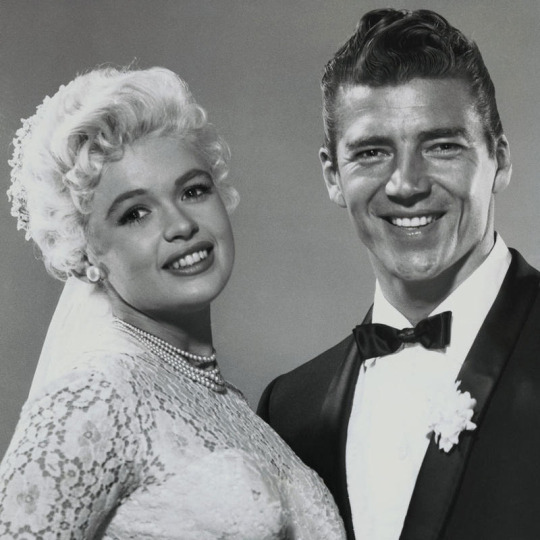
“On January 4, Jayne (wearing a leopard-skin cape, hat and muff) told Louella Parsons, “We are going to have a very quiet wedding and then we’ll fly to Dallas where my mother plans to give a reception for our friends there.” Then everyone had a good laugh and went to work on the real plans. The happy couple held another press event, showing off her ring and trousseau. They sent out one hundred invitations (on pink paper, of course). “This is one time I don’t want a lot of publicity,” Jayne unconvincingly told the assembled reporters and cameramen. (“It just happens that most of her friends are newspapermen,” said Jim Byron). Jayne and Mickey chose January 13 for the wedding date, “because Mickey and I met on the 13th. He won the Mr. Universe contest on the 13th and got his American citizenship on the 13th. I just love that number.” Jayne added, “I’m so happy. We’re both on a pink cloud.” Jayne picked the Wayfarer’s Chapel in Palos Verdes for the wedding – designed by Lloyd Wright (son of Frank Lloyd Wright) in the 1940s, it was a modernistic glass and wood building that looked like the skeleton of a church. Glass was the key factor here: people who couldn’t get into the wedding could still see it – and photograph it. The only concern being would they crash through the walls in a disaster of blood and shards? “I want the ceremony to be serious and serene,” Jayne reiterated. “It’s going to be entirely free of photographers. Except maybe just one, from the studio. Well, I don’t suppose I can keep the photographers away if they want to come.” Andrew Carthew of the Daily Herald wrote that Jayne described the wedding, “with some slight irreverence, as the Greatest Publicity Stunt in History.”
/ From the 2021 biography Jayne Mansfield: The Girl Couldn’t Help It by Eve Golden /
On this day 66 years ago (13 January 1958), quintessential show business couple Jayne Mansfield and Miklós "Mickey" Hargitay married. Their tumultuous on-and-off relationship would play out within the flashbulbs of international paparazzi. They would have three children together, perform together on film and onstage in Las Vegas, ultimately divorcing in 1964. (Mansfield would die in 1967, Hargitay in 2006).
#jayne mansfield#mickey hargitay#lobotomy room#sex kitten gone berserk#platinum blonde#publicity stunt#starlet#old show biz#kitsch#jayne mansfield and mickey hargitay#show biz couple#old hollywood#classic hollywood#glamour#wedding day#bride and groom#retro
25 notes
·
View notes
Text


theodor-heuss-ring // köln kunibertsviertel
theodor-heuss-ring is full of representative post-war modernist buildings in various styles. most of them are in a very good state of preservation, at least as far as the façades are concerned. so you can always discover beautiful details and designs.
#design#photography#architecture#architecture photography#moderne#nrw#cologne#köln#germany#post war architecture#cologne post war architecture#post war modern#rhineland post war modern#cologne post war modern#german post war architecture#german post war modern#nachkriegsmoderne#nachkriegsarchitektur#kölner nachkriegsarchitektur#kölner nachkriegsmoderne#deutsche nachkriegsmoderne#deutsche nachkriegsarchitektur#kunibertsviertel
32 notes
·
View notes
Text
TOLKIEN, MYTH AND THE EARLY 20TH CENTURY
A week ago I wrote a post about my excitement in discovering just how much Tolkien took inspiration from Anglo-Saxon poetry.
I was so lost in my little over-emotional bubble that I was genuinely a little surprised when a few people expressed their disappointment in discovering that "The Lord of The Rings" wasn't wholly original. It makes sense, though, so I thought I'd address it.
These are @fortunes-haven ' s tags:
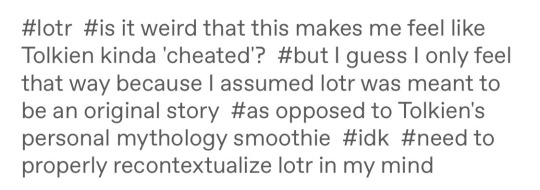
@sataidelenn already wrote an interesting reply, but I'd like to approach the question from a different point of view. Why? Because the first thing I thought about when reading this comment was how I myself have grumbled under my breath about having to wade through someone's "personal mythology smoothie", only I wasn't reading Tolkien. I was reading T. S. Eliot.
Now, I want to preface this by making it clear that I am well aware Tolkien is by no means a modernist. He did, however, write LOTR in England in the late 30s. He was part of the same culture, the same society, and above all the same historical context that produced "The Waste Land" and "Ulysses", and I think we should take that into account when we discuss his work.
Because by the time Tolkien published LOTR, Joyce and Eliot and Yeats had already discussed and applied the mythic method. Was Tolkien aware of their debates? Did he read and appreciate their books? I have no clue. It would take some research to find out, research I currently (unfortunately) don’t have time for. But I do not think it a stretch to suggest that Tolkien might have been moved by the same need that drove other writers to look back at myth, although in very different ways.
Why did Joyce and Eliot feel compelled to return to the narrative roots of mankind? Why did Yeats devote so much time to Celtic lore? Why did Tolkien write a new epic and base it on the Saxon world?
The answer is the same: because they lived at the start of a century that posed more questions than ever, but provided no answers; a century when time and the human mind and the very structure of matter had ceased to be solid, defined, a foundation to rely on; a century torn apart by brutal, inhumane, sensless war.
When you can't find answers in the present and the future is so uncertain it's laughable, you look to the past. Because the thing is, we can talk about "personal mythology" all we want, but myths are never personal. They are universal. They are tied to a specific cultural context, certainly, but they exemplify emotions, truths and tragedies that are common (or supposed to be common) to all humankind, beyond space and time. Myths are supposed to be eternal.
They are also a very effective shorthand to communicate rather complex concepts.
I can write five pages telling my girlfriend that she makes me feel safe, that she is something I've longed for and fought to gain, something I've dreamed about but that I'm scared I'll lose. I could, and I probably wouldn’t be able to convey exactly what I mean.
Or I could say "She is my Ithaca" and you would get it, wouldn’t you?
There are whole books that try to explain the symbolism behind "The Green Knight", but Eliot can offhandedly mention a chapel and he has basically evoked the whole original poem plus the centuries of scolarship that followed.
Tolkien could have had his characters recite long monologues about how they feel like their world has been lost. Instead, he has one of them sing a song by the campfire. An 8th century song, about a warrior in exile. He achieves in a couple of lines what could have taken him a whole book to convey, and he does it in a way that goes straight to the heart, even if we don't know exactly why.
And that's the thing: not all of us spend years researching myths and old poetry. Certainly we don't do it when reading LOTR for the first time, especially if that's when we are 13 or 10 or 8 years old. But we get it anyway. We know myths, especially Western myths, one way or another, as if through cultural osmosis. We understand myths from other cultures too- we may need a bit of context, but we do- and often we find that the bones of the stories are similar, across oceans and centuries.
That means that using myths as the building blocks of your story is an amazingly effective way to cut to the quick, to get to the core of what the narrative is aiming at.
I have seen so many people talk about the feeling they get when reading LOTR, or even just thinking about it: that nostalgia? That bittersweet hurt? That longing for something bright and lost, for a star or a jewel or a land beyond the sea? That, right there. That is what Tolkien achieves by telling stories inside stories, by having his words have a meaning and weight that we would associate with a bard or a preacher, not a fantasy writer. And, as I have discovered recently, it's almost exactly the same feeling you get when reading Saxon poetry.
It's almost as if he chose it on purpose, isn’t it?
That's not all, though.
As both people tagged above(and many others, myself included) have already written, Tolkien doesn’t just use myths as building blocks. He alters them.
Yes, Frodo's hero's journey is not typical. Yes, there are a lot of similarities between the last part of LOTR and the Odissey, but they are not quite the same.
That's because Frodo is not, and can't be, Ulysses. He isn’t a warrior crowned with glory and cunning who reconquers his home and that leaves it because a god has promised him peace if he does. He is a mutilated soldier coming home from the trenches, only to find that he no longer belongs in the home he has bled for.
Frodo is a new hero, for a new age (just like Ulysses was a new hero for a new age, which I rather think is one of the reasons Joyce chose him as the model for his novel. The Odissey was already subversive in and of itself. "An odd duck", as @sataidelenn put it.)
We have to understand just how traumatic WWI was. It's a shift, a break so immense that it changed society, politics, culture, family structures, the idea of hero and even of manhood. The Western World was not the same after 1918. Of course art changed too.
Would Tolkien have written LOTR had he not fought in that war? Probably. But it would have been a very, very different book. The way it deals with war, technology, trauma, peace and friendship-all the things we love about it- are direct fruits of that conflict. I think the way myth fits into it is, too.
I can understand being disappointed that not everything in Lotr is wholly new, wholly Tolkien's invention. It didn’t even occur to be to be, though, because I am used of thinking of it in these terms.
All the myths he uses- from Kullervo to Ulysses to Beowolf to medieval fairy tales- are means to tell a new story. They come back to life, and while we perceive how timeless they are, they end up telling us something that is rooted in time. A new English epic, yes, but very clearly an epic of England between two world wars. A 20th century heroic tale which offers a desperate, brave hope for the future. How can we not love it?
And look, I might joke about personal mythology smoothies to myself all the time, but the reason I keep reading and studying Eliot and Joyce and Yeats is that they do have something new to say, something amazing. You can take them or leave them, love them or hate them, but "unoriginal" is not an adjective you can, in good conscience, apply to their work.
I think, in a weird way, Tolkien is the same.
"In manipulating a continuous parallel between contemporaneity and antiquity, Mr. Joyce is pursuing a method which others must pursue after him. They will not be imitators, any more than the scientist who uses the discoveries of an Einstein in pursuing his own, independent, further investigations. It is simply a way of controlling, of ordering, of giving shape and significance to the immense panorama of futility and anarchy which is contemporary history. It is a method already adumbrated by Mr. Yeats, and of the need for which I believe that Mr. Yeats to have been first contemporary to be conscious. Psychology (such as it is, and whether our reaction to it be comic or serious), ethnology, and The Golden Bough have concurred to make possible what was impossible even a few years ago. Instead of narrative method, we may now use the mythic method. It is, I seriously believe, a step toward making the modern world possible for art." –T.S. Eliot, from Ulysses, Order, and Myth (1923)
#tolkien#lotr#tolkien meta#literature#myth#does this make sense? I hope it does#I really wanted to reply earlier but alas life#you can tell I have put a tiny bit of thought in this over the years uh
20 notes
·
View notes
Photo
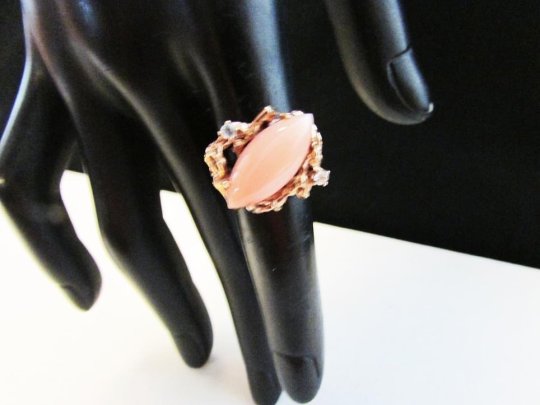
Vintage Estate 14K Modernist Organic Pink Coral Ring @alohamemorabiliaco #instaview #instajewelry #ring #showmeyourrings #coral #coralring #organic #vintagejewelry #estatejewelry #modernist https://www.instagram.com/p/CoHAt94uPQ0/?igshid=NGJjMDIxMWI=
#instaview#instajewelry#ring#showmeyourrings#coral#coralring#organic#vintagejewelry#estatejewelry#modernist
0 notes
Text
Lord of the Rings is the ultimate masterpiece of the modernist, post-war literature movement and that is a hill I will die on
#Hemingway WISHES he had an OUNCE of Tolkien’s ability to tell a post-war trauma story#we study Mrs Dalloway and Sun Also Rises and Heart of Darkness as modernist literature#when we should have been adding in tolkien all along#ironically tolkien is spinning in his grave at the very suggestion that his books are allegorical#…mostly bc I think he knows they were subconsciously an allegory and he didn’t want to face that#lotr#tolkien#change my mind meme
28 notes
·
View notes